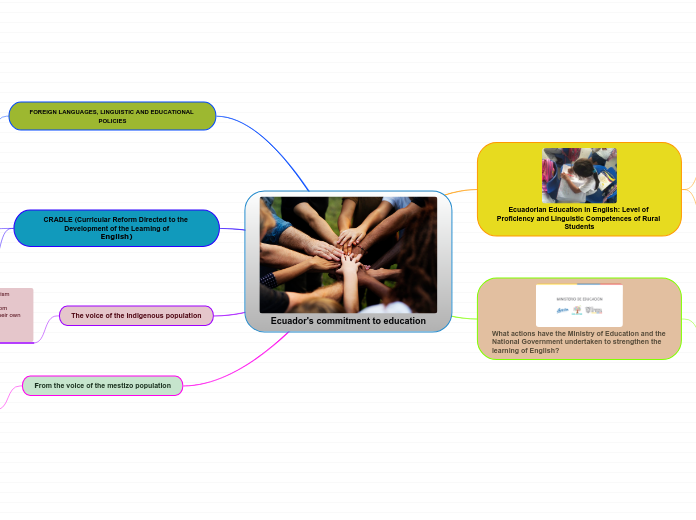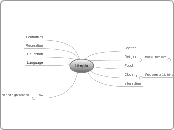Ecuador's commitment to education
What actions have the Ministry of Education and the National Government undertaken to strengthen the learning of English?
The strengthening of the English language in educational institutions is not an appropriate topic but rather a process that has been worked on for several years and responds to a government plan and a political will to transform Education.
Actions undertaken:
- Three years ago the English teachers were evaluated. The results were not the best, so a training process abroad was undertaken.
- 500 teachers studied at the University of Kansas and are inserted in the public education system. Currently, 200 teachers attend this training.
The goal is to reach the 5,000 teachers trained by the “Go Teacher”.
- Through the "I want to be a teacher" program, around 3,550 teachers are enrolled to take the TOEFL, to later be evaluated, and reach B2 and, with that, reach their appointment.
- More than 50 teachers are studying English outside the country so that they return and lead, in their territory, the learning processes.
- Reformulation of the curriculum.
- Obligatory nature of English from eighth grade of EGB to third grade of high school.
- In order for English to be taught from the 2nd year of EGB, by 2017, 7,000 teachers are needed.
Referencias
EDUCACIÓN, M. D. (s.f.). Ministro de Educación explica el fortalecimiento del aprendizaje del inglés en el sistema educativo del país. Obtenido de https://educacion.gob.ec/ministro-de-educacion-explica-el-fortalecimiento-del-aprendizaje-del-ingles-en-el-sistema-educativo-del-pais/
Ecuadorian Education in English: Level of Proficiency and Linguistic Competences of Rural Students
In this sense, international and modern exams have become the means that certify the sufficiency of this foreign language for students and teachers of different educational levels.
To achieve these objectives, a quantitative exploratory study was carried out in eight educational institutions with students from (BGU) of the canton Azogues, since they indicate that the level of English proficiency of the participants is unsatisfactory, corroborating existing data on the low level of English proficiency in the Ecuadorian student.
Furthermore, the participants showed a low level of proficiency in three language skills, which would make it difficult to use the target language for different purposes in their future life.
Fuente: Ortega Auquilla, D. P., & Fernández, R. A. (2017). La Educación Ecuatoriana en Inglés: Nivel de Dominio y Competencias Lingüísticas de los Estudiantes Rurales. Revista Scientific, 2(6), 52-73. https://doi.org/10.29394/scientific.issn.2542-2987.2017.2.6.3.52-73
The teaching-learning of English has taken a big turn in the Ecuadorian educational system in the last two decades and several measures have been implemented.
From the voice of the mestizo population
In the field of language teaching in our country, the inhabitants are reluctant to include a foreign language in the regular curriculum of the schools, whether in the Spanish system or in the intercultural bilingual system15: “I don't think another language should be taught. Priority should be given to teaching Spanish (MAD, 11. 97).
The voice of the indigenous population
Sacha Foundation that works on self-managed ecotourism projects for quichua-speaking people
In Ecuador, they assure that there is a high demand from indigenous people to learn English in order to control their own resources because the English language
has become a necessary working tool for
survival.
English teachers working in rural areas
"For many mestizos, speaking other languages may simply be a required subject in their schools, but for my students here, it has become a
real need. "(DC, 11.20.97).
One of the teachers at an indigenous school in northern Ecuador, Cotacachi,
comments on the importance of providing children with a quality education that allows them
access higher educational levels such as the mestizo population.
It also points out the need forget rid of the devastating stereotype against indigenous children.
CRADLE (Curricular Reform Directed to the Development of the Learning of
English)
The Foreign Language Administration was established in 1992 by virtue of an agreement
signed between the Ministry of Education and Culture (MEC) and the British Council.
Development of the four skills:
-hear
-talk
-read
-write
This project named CRADLE (Curricular Reform Directed to the Development of the Learning of English), is he result of a bilateral technical cooperation agreement between the governments of Ecuador and the United Kingdom, for the curricular reform in the area of English in public and semi-public schools in Ecuador.
The main objective of the CRADLE project is to grant
students a firm foundation in the use of English, and thus offer them a better
future.
It is attempted communicatively through a series of books adapted to the Ecuadorian reality.
At the same time, this program provides technical assistance to teachers.
FOREIGN LANGUAGES, LINGUISTIC AND EDUCATIONAL POLICIES
By 1990, post-secondary programs were established; These consisted of offering a two-year specialization
in the area of the nursery school.
One of the topics included in this postsecondary program was
English.
The training of teachers in the intercultural bilingual educational system began in 1993
through the Bilingual Intercultural Pedagogical Institutes (IPIB).









